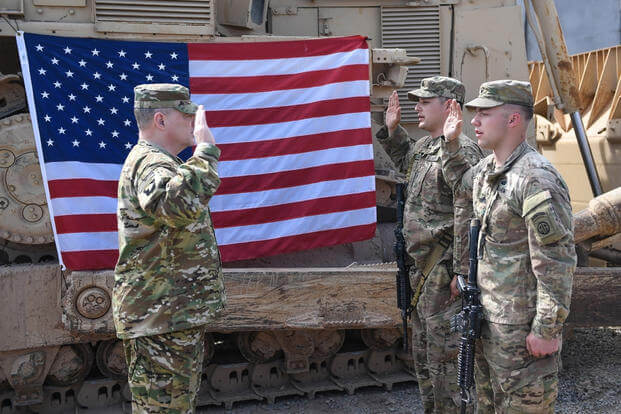Veterans looking for jobs are likely to tell employers the values they gained from their service -- the ability to do hard work, follow orders and lead others. They would do well to emphasize their strong foundation in ethics as well.
Military Code of Conduct = Outstanding Business Ethics
"There wasn't exactly what you might call specific ethical training in the early 2000s," said Joel Skrabacz, a former corporal and metal worker who served in Iraq.
"You understood to respect everyone equally according to their rank," he said. That went for civilians, too, who were addressed "always as ma'am or sir, which is what you would say to officers," Skrabacz said. "So you kind of held them in a respectful way."
John Higgins, a former public affairs staff sergeant who also served in Iraq, says what business would call ethics training was "pretty much constant, like all training."
As noncommissioned officers (NCOs) -- the Army's middle management -- Skrabacz and Higgins were expected to follow a different set of rules than the soldiers they commanded.
"Being a soldier, you had your own set of Army ethics," he says. "Safety was the way you were told. As a NCO, you're to know and understand the NCO creed."
The NCO Creed
The creed begins with, "No one is more professional than I." It could come right out of a textbook at business school.
"I will be loyal to those with whom I serve; seniors, peers, and subordinates alike," it reads.
Superiors "will have maximum time to accomplish their duties; they will not have to accomplish mine," it continues. "I will exercise initiative by taking appropriate action in the absence of orders."
The creed affirms, "I will not compromise my integrity, nor my moral courage."
Officers are also briefed regularly on the laws of war and the law of the countries they're deployed in, Higgins says.
"We knew to follow whatever regulations that we were told, when dealing with local, state and federal laws," confirms Skrabacz.
Within his own specialty, Higgins says the Army's ethics training is even more detailed and clear.
"We can't actually do propaganda," he says. "If you can't confirm something, you don't put it out. If you knowingly put out false information as a public affairs officer, you lose the job."
The limits on altering photos are stricter than those of some newspapers, where photo editors may tweak contrast and color balance to make pictures more dramatic.
"You don't alter photos," Higgins said. "If someone is wearing a green shirt and you screw up the white balance so bad, it looks blue, you can correct it back to how it looks in reality, but you can't just change things for dramatic purposes; either take better photos or get out."
High Ethical Standards Are in a Veteran's DNA
Higgins brings those military ethical standards to his postwar work as a journalist, and now as a public affairs professional for Aaski Technologies, which provides contractors for the military.
Tracy Miller, a lecturer at MBA@Dayton, sees another value in veterans. "They're still at this crossroads of, 'Here's a bureaucracy where you have a chain of command and we're used to operating like this,' and there's some value to that," she said.
Skrabacz, now a millroom operator at Lord Corporation, which makes components for helicopters and other applications, also says his Army ethics carried on into civilian work.
"It's a must in this business to properly mark components or label materials," he said. "There are many levels of manufacturing ... every step is important. I remember that fellow soldiers will fly in these machines. There are no redundant parts on a chopper.
"Doing your best and being honest is a must," Scrabacz said. And those are the ethics companies need most.
Find the Right Veteran Job
Whether you want to polish your resume, find veteran job fairs in your area or connect with employers looking to hire veterans, Military.com can help. Subscribe to Military.com to have job postings, guides and advice, and more delivered directly to your inbox.















